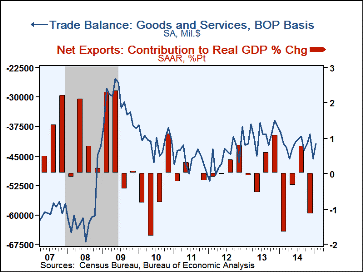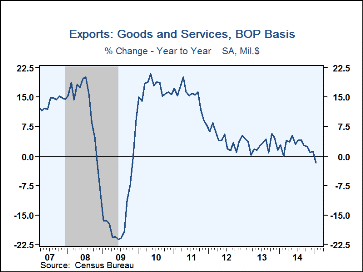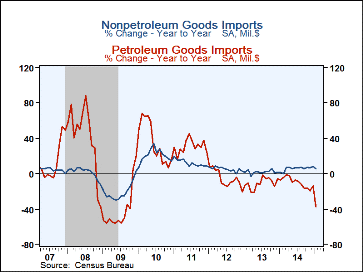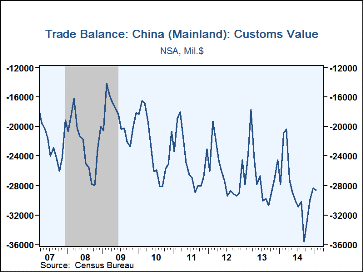 Global| Mar 06 2015
Global| Mar 06 2015U.S. Trade Deficit Narrows as Exports and Imports Both Decline
Summary
The U.S. foreign trade deficit in goods and services decreased to $41.8 billion in January from December's $45.6, revised from $46.6 billion. This January net result was almost exactly equal to the $42.0 billion expected in the Action [...]
The U.S. foreign trade deficit in goods and services decreased to $41.8 billion in January from December's $45.6, revised from $46.6 billion. This January net result was almost exactly equal to the $42.0 billion expected in the Action Economics Forecast Survey.
Imports fell back in January by 3.9% (-0.2% y/y) after December's 1.8% increase. Both petroleum and nonpetroleum goods shared in the decline. Petroleum fell a substantial 21.9% (-37.3% y/y), reflecting the widely publicized crude oil price drop, which amounted to 19.9% in the one month, to $58.96 per barrel from $73.64 in December. The quantity of energy-related petroleum imports also fell, by 6.5% (-6.0% y/y) after December's surge of 31.7%. Nonpetroleum goods imports fell 1.1% in January (+6.8% y/y) and imports of services fell 1.3% (+5.7% y/y).
Overall exports fell 2.9% after a 0.9% December decline, and the January amount was down 1.7% y/y. Exports of goods were down 4.1% (-3.9% y/y) and exports of services were off 0.1% in the month (+3.1% y/y).
In constant 2009 dollars, imports of goods were down 1.6% in January (+5.2% y/y) and exports of goods fell 2.0% (+2.9% y/y).
The decline in real merchandise exports encompassed four major end-use groups: food, feed & beverages dropped 7.8% (-4.7% y/y), autos & parts were down 6.9% (+2.8% y/y), and capital goods ex autos fell 1.1% (+1.9% y/y), while "other" fell 17.6% (+12.3% y/y). Consumer goods exports other than autos rose 1.5% (+9.2% y/y), and industrial materials & supplies gained 1.4% (+3.2% y/y). On the import side, there were declines in consumer goods, 4.0% (+4.2% y/y), "other", 3.6% (+13.6% y/y), industrial materials & supplies, 2.6% (+1.6% y/y) and autos & parts, 1.4% (+10.7% y/y). There were gains in food, feed & beverages, 5.2% (+8.0% y/y) and capital goods, 0.5% (+6.2% y/y).
By country, the deficit in goods with China was $28.6 billion in January, almost unchanged from December's $28.3 billion. Imports from China actually edged down 0.1% y/y while exports were down 7.8%. The trade deficit with Japan was similarly stable month-on-month, at $5.8 billion in January versus $5.7 billion the month before. Exports to Japan dropped 7.7% y/y, and imports were up a mere 0.1% y/y. The trade deficit with the European Union improved to $9.3 billion in January from $13.6 billion in December and was the smallest since last February. Exports to Europe were up 3.6% y/y, and imports were up 4.2% y/y.
The international trade data can be found in Haver's USECON database. Detailed figures are available in the USINT database. The expectations figures are from the Action Economics Forecast Survey, which is carried in the AS1REPNA.
| Foreign Trade (Current Dollars) | Jan | Dec | Nov | Y/Y | 2014 | 2013 | 2012 |
|---|---|---|---|---|---|---|---|
| U.S. Trade Deficit | $41.8 bil. | $45.6 bil. | $39.5 bil. | $38.8 bil. (1/14) |
$505.0 | $476.4 bil. | $537.6 bil. |
| Exports (% Chg) | -2.9 | -0.9 | -1.0 | -1.7 | 2.9 | 2.9 | 4.2 |
| Imports | -3.9 | 1.8 | -1.8 | -0.2 | 3.4 | 0.1 | 2.9 |
| Petroleum | -21.9 | 7.2 | -11.3 | -37.3 | -9.6 | -11.0 | -5.5 |
| Nonpetroleum goods | -1.9 | 1.0 | -0.8 | 5.8 | 6.0 | 2.0 | 5.2 |
Carol Stone, CBE
AuthorMore in Author Profile »Carol Stone, CBE came to Haver Analytics in 2003 following more than 35 years as a financial market economist at major Wall Street financial institutions, most especially Merrill Lynch and Nomura Securities. She had broad experience in analysis and forecasting of flow-of-funds accounts, the federal budget and Federal Reserve operations. At Nomura Securities, among other duties, she developed various indicator forecasting tools and edited a daily global publication produced in London and New York for readers in Tokyo. At Haver Analytics, Carol was a member of the Research Department, aiding database managers with research and documentation efforts, as well as posting commentary on select economic reports. In addition, she conducted Ways-of-the-World, a blog on economic issues for an Episcopal-Church-affiliated website, The Geranium Farm. During her career, Carol served as an officer of the Money Marketeers and the Downtown Economists Club. She had a PhD from NYU's Stern School of Business. She lived in Brooklyn, New York, and had a weekend home on Long Island.
More Economy in Brief
 Global| Feb 05 2026
Global| Feb 05 2026Charts of the Week: Balanced Policy, Resilient Data and AI Narratives
by:Andrew Cates









